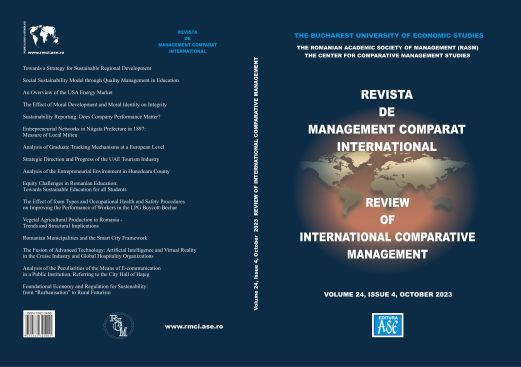The Fusion of Advanced Technology: Artificial Intelligence
and Virtual Reality in the Cruise Industry and Global
Hospitality Organizations
The Fusion of Advanced Technology: Artificial Intelligence
and Virtual Reality in the Cruise Industry and Global
Hospitality Organizations
Author(s): Carmen Florentina VLASCEANU, Teodorov Alexandru VALENTIN, Gabriela ȚiguSubject(s): Economy, Supranational / Global Economy, Business Economy / Management, Tourism, ICT Information and Communications Technologies
Published by: EDITURA ASE
Keywords: technological advancements; artificial intelligence; virtual reality; cruise industry; hospitality;
Summary/Abstract: The cruise industry and global hospitality organizations have consistently showcased a prime focus on delivering exceptional customer experiences. In contemporary times, significant breakthroughs in technology, notably the development of Artificial Intelligence (AI) and Virtual Reality (VR), have emerged as instrumental tools in enhancing the quality of service and customer perception. This article investigates the significant influence of AI and VR technologies on the cruise industry as well as multiple sectors within the realm of hospitality. Incorporating scholarly research and industry case studies, we underscore the significance of these technologies in relation to the customer experience and explore the ways in which they can enhance the standard of service. The main research aims focus on elucidating the role that AI and VR play in enriching customer experiences and enhancing service quality while emphasizing the significance of these technologies within these industries. Methodologically, this research draws upon a comprehensive review of academic literature and real-world examples to provide an in-depth analysis of the subject. The results highlight the crucial importance of AI and VR technologies in hospitality industry. The utilization of AI-powered chatbots and virtual assistants has brought about a paradigm shift in personalized customer service, data-driven decision making, and the enhancement of the overall guest experience. Similarly, Virtual Reality (VR) facilitates immersive virtual tours, training sessions and professional development for employees, while also providing distinctive experiences for guests. These technologies play a crucial role in attaining convenience, personalization, efficiency and competitive edge, all of which make substantial contributions to enhancing the cruise customer experience. Based on these findings, several recommendations can be put forth for enterprises functioning in the cruise and hospitality industries. The initial step to be considered by the hospitality organizations is the allocation of resources towards AI-driven systems that facilitate tailored customer interactions and data analysis, thereby enabling the enhancement of decision-making through well-informed processes. It is imperative to prioritize the integration of virtual reality (VR) technology for the purposes of providing virtual previews, facilitating staff training and enhancing the guest’s experience. Therefore, businesses must continuously innovate and adapt to stay competitive in the evolving technological landscape.
Journal: Revista de Management Comparat Internațional
- Issue Year: 24/2023
- Issue No: 4
- Page Range: 650-665
- Page Count: 16
- Language: English

